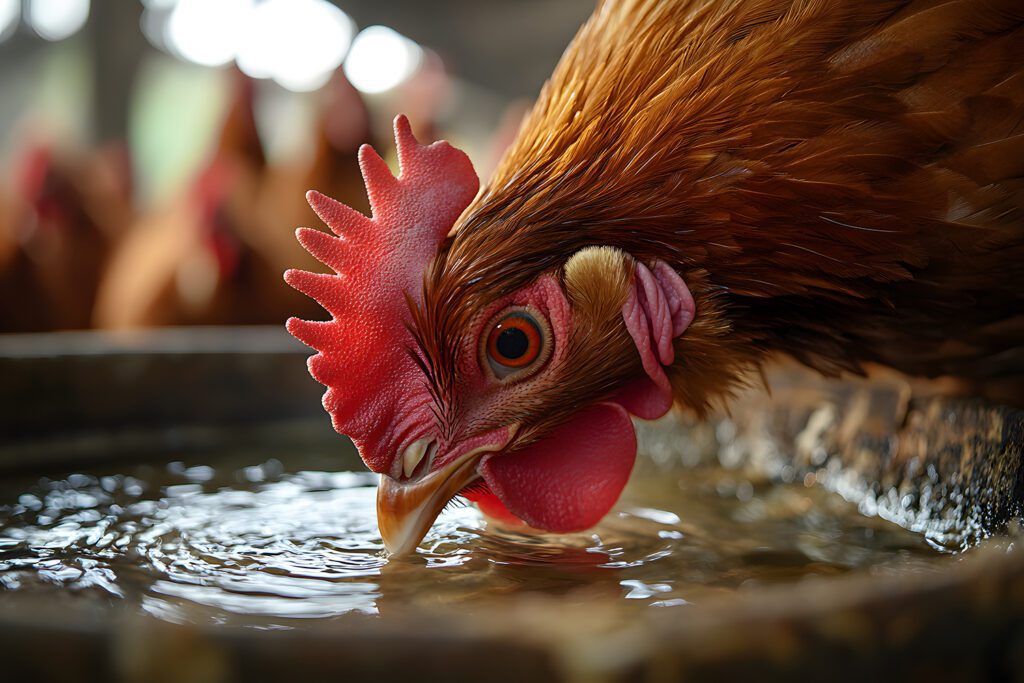
Did you know that adding white vinegar or apple cider vinegar to chicken water is a simple step many flock owners overlook? It’s an easy, everyday habit that can be part of your natural chicken care routine, helping you stay proactive about your flock’s health.
Vinegar can fit seamlessly into your daily routine, from understanding the right amounts to knowing the best times to offer it. So, let’s explore how much to add, when to give it, and practical tips for using it safely so you can make confident choices that support your chickens’ well-being, digestion, and overall vitality.
Adding vinegar to your chickens’ water can help support their overall health, aid digestion, and create an environment that discourages the growth of harmful bacteria. When used correctly, vinegar acts as a natural supplement rather than a cure-all, making it an integral part of a balanced poultry care routine.
Using vinegar for chicken health can help your birds maintain a strong gut, which improves nutrient absorption, boosts immunity, and keeps your flock thriving — all essential if you want productive hens and healthy meat birds. By incorporating vinegar into their water, you take a simple, natural step to care for your flock daily.
Using apple cider vinegar (ACV) in your chickens’ water can provide several benefits that support their overall health and well-being. ACV’s acids and trace minerals help maintain a balanced gut, improve nutrient absorption, strengthen immunity, and keep your flock thriving.
Some of the key benefits of apple cider vinegar for chickens include:
By adding ACV to your chicken’s water, you’re taking a simple, natural step that can help your flock stay productive, healthy, and more resilient.
Getting the dosage right is essential to keep your chickens healthy and avoid upsetting their digestive system. A general guideline you can follow is:
1 tablespoon of apple cider vinegar per gallon of water.
You don’t need to give it every day. Offering vinegar water a few days each week, especially during stress, molting, or introducing new birds, is enough to support your flock without over-acidifying their system. Continuously rotate with plain water so your chicken stays comfortable and hydrated.
Additionally, avoid using apple cider vinegar when your chickens are on certain antibiotics because ACV can neutralize some medications.
Tip: Only use plastic or rubber waterers when adding vinegar. Acids can corrode metal, potentially leading to harmful zinc leaching into your chickens’ water. By following these simple steps, you can safely include ACV in your flock’s routine and feel confident that you’re supporting their health naturally.
If you don’t have apple cider vinegar on hand, white vinegar can also be helpful, particularly as a cleaning aid or mild disinfectant for waterers and feeders. While it doesn’t offer probiotics, white vinegar still contains acetic acid, which:
White vinegar is a great option for maintaining a clean environment, but apple cider vinegar is the better choice for its internal health benefits.
When using white vinegar in water for cleaning or mild antibacterial support, it’s important to follow the safe vinegar dosage for poultry to protect your flock and their drinkers:
By using white vinegar thoughtfully, you can clean your flock’s environment while supporting overall health and safety.
You might wonder when it’s best to include vinegar in your chickens’ water. While vinegar can be a helpful addition to your flock’s routine, timing it correctly can maximize its benefits and keep your birds healthy and comfortable. You can use vinegar water strategically during times when your chickens might need extra support, such as:
Always check labels or consult a poultry care expert for guidance. By timing vinegar correctly, you can give your flock natural support exactly when they need it most.
Even natural supplements have limits, and there are times when vinegar may do more harm than good. You should skip vinegar if:
Always observe your flock after introducing any change. Chickens are great at signaling what’s working and what isn’t. Knowing when not to use vinegar is just as important as knowing when to use it, so you can keep your birds safe and healthy.
Adding apple cider or white vinegar to chicken water is an easy, low-cost way to support your flock’s health. It helps maintain digestion, keeps waterers cleaner, and gives your chickens extra support — whether you have backyard layers or Freedom Ranger broilers.
Mixing apple cider vinegar (ACV) into your chickens’ drinking water offers several health advantages. It aids in digestion, strengthens their immune system, and creates a more acidic environment in the gut, which can make it harder for parasites like coccidiosis to thrive. Additional perks include less smelly droppings, cleaner waterers thanks to reduced algae growth, and improved hydration since many chickens enjoy the flavor. Just be sure to use the proper amount and stick to plastic waterers to avoid metal corrosion.
Start small, watch your flock, and adjust as needed. For more tips on natural poultry care, check out our resources at Freedom Ranger Hatchery to help your birds thrive year after year.